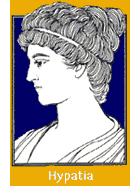
 |
|||||||||||||
|
How come I never heard about this? |
But of their interchange of ideas and ideals we hear not a whisper. Surf to the course descriptions at your favorite university's classics or religion departments, say classics at Harvard, and look for courses comparing and contrasting Christianity to Ancient Pagan religions. You won't find any. Christianity compared to Judaism, Islam, Hinduism, Buddhism, yes. Christianity compared to Paganism, nothing. |
| It's
as if a thousand years of western religious history never happened. Why?
It ain't so. |
|
The meaning of the Son of God's life and Sacrifice? Salvation. With the sacrament of holy Baptism, believers are reborn into a new life with the Savior. In a sacred meal, believers eat bread and wine that are the body and blood of the Son of God. The name of the Pagan Son of God? Wrong question. Try, The names of the Sons of God? Answer: Mithras. Osiris. Attis. Dionysus, Hercules, Krishna. Jesus. |
 Alexandria,
Egypt. 415 AD Alexandria,
Egypt. 415 AD Enraged over a point of doctrine about the true nature of Christ, Cyril, Christian patriarch of Alexandria, incites a pogrom against people who deny his own theory. Cyril's co-religionists assert their faith by burning the homes of doctrinal opponents and driving entire communities from the city. On a fateful day Hypatia -- the non-Christian scholar, philosopher, and teacher renown throughout the Mediterranean world for her devotion to learning and enlightenment -- steps onto her chariot to ride through town to the great Library of Alexandria. A mob gathers, chanting slogans against her. |
|
The rioters close in, jamming Hypatia's chariot to a stop, grabbing her, jerking her down and out into the street where eager hands strip the young woman naked. Jeering they drag her to a church where Christian officials promptly butcher her. Gibbon describes > |
"her flesh was scraped from her bones with sharp oyster shells, and her quivering limbs were delivered to the flames." [Decline and Fall Ch XLVII]
|
So why mention the murder of Hypatia? Because her story helps answer the question you're already thinking: "OK, if Christianity had Pagan origins, how come I never heard about it?" History is written by the winners. You've never heard about the Pagan origins of Christianity because as Christians institutionalized the Church starting in the 300s AD, their reaction to Pagan competition was to deny and suppress Pagan teaching. To burn Pagan writings. To drive dissident communities into the desert. To murder Pagan scholars. It
worked well.
So well that the word Pagan is a pejorative. So well that much of our
modern understanding of these faiths is available only because scholars
have reconstructed Pagan theology by reading between the lines of anti-Pagan
Christian propaganda -- the original Pagan literature having been lost
in the bonfires of suppression. You know the
Christian version of the history of religion because the Pagan version
was suppressed. |